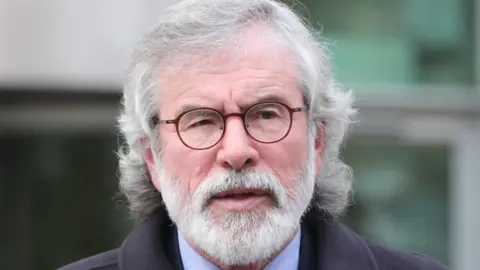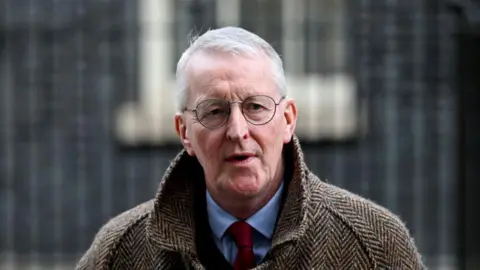Gerry Adams in line for 'pay day' if Legacy Act repealed
 Niall Carson/PA
Niall Carson/PAFormer Sinn Féin president Gerry Adams is in line for "a pay day from the taxpayer" under plans to repeal the Legacy Act, a report backed by several peers has stated.
The legislation presently blocks him - and many others interned without trial in the 1970s - from claiming compensation for unlawful detention.
Policy Exchange, a London-based think tank, has criticised moves to lift the ban.
Labour, which has begun the process of repealing the act, said the previous government's approach to legacy was "almost universally opposed in Northern Ireland".
Could result in six-figures
A Supreme Court judgement in 2020 paved the way for Mr Adams to receive damages after it quashed his convictions over two attempted prison break-outs.
It ruled his detention was unlawful because the interim custody order (ICO) had not been "considered personally" by the then Northern Ireland Secretary Willie Whitelaw.
At the time, the Conservative government argued the ICOs were lawful due to a convention known as the Carltona principle, where officials and junior ministers routinely act in the name of a secretary of state.
A clause was inserted into the Legacy Act, blocking payouts to Mr Adams and about 400 other people interned in similar error.
Should the change to the Legacy Act be endorsed by parliament, Mr Adams is thought highly likely to pursue compensation.
If he is successful, it could result in a six-figure payout, covering both his unlawful detention and prosecution for attempted escapes, for which he was sentenced to four and a half years imprisonment.
'Unlawful provisions'
In February, the High Court ruled the parts of the act related to the ICOs were incompatible with the European Convention on Human Rights.
The government has now tabled a remedial order in Parliament that will repeal various parts of the Legacy Act, including the sections covering ICOs.
The Policy Exchange paper criticising the move has been backed by 16 peers, including Shadow Attorney General Lord Wolfson KC.
He said: "The government's decision to repeal sections 46 and 47 of the Northern Ireland Troubles Act 2023 is inexplicable and unexplained.
"Parliament must now ask hard questions about why the government is determined to override Parliament's recent, unanimous decision to vindicate the Carltona principle and to block Gerry Adams from being paid public money."
A government spokesperson for the Northern Ireland Office said: "During the Legacy Act's passage through Parliament, that government belatedly agreed to an amendment on the custody orders, despite the original ruling having been made all the way back in 2020.
"Last year, that amendment was ruled by the Northern Ireland courts to be unlawful and therefore it needs to be repealed."
They added that "it should not be forgotten that the Legacy Act also included a scheme that allowed for immunity from prosecution, including for those who committed the most appalling terrorist crimes".
"We are also repealing these unlawful provisions and will be bringing forward new primary legislation to address the full range of legacy issues."
 Reuters
ReutersWhat is the Legacy Act?
The act was the government's controversial attempt to "draw a line" under the Troubles in Northern Ireland.
It was first proposed by the then prime minister Boris Johnson in 2021 as a solution to ending what he called "vexatious prosecutions" of former soldiers.
It was passed in 2023, but was opposed by victims' groups and all the main political parties in Northern Ireland.
The act created a new legacy body known as the ICRIR to take over all Troubles-era cases from 1 May 2024, including those on the desk of the Police Service of Northern Ireland (PSNI).
It also shut down all historical inquests.
The act's most controversial element, the offer of conditional immunity to suspects, was disapplied following legal action by bereaved families.
The court ruled this part of the act was incompatible with human rights' legislation and the Windsor Framework.
Labour pledged to repeal the Legacy Act if they won the general election in July and formally began that process in December.
